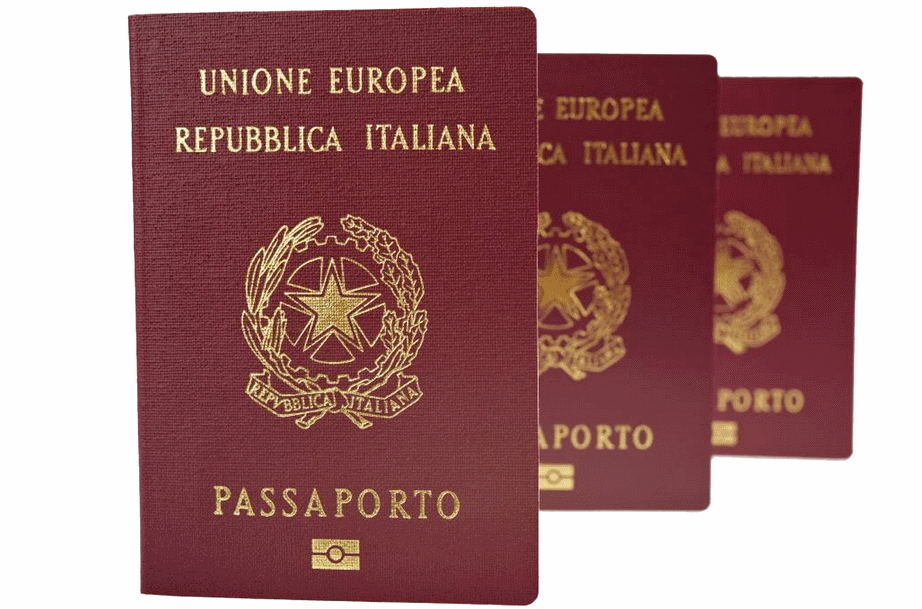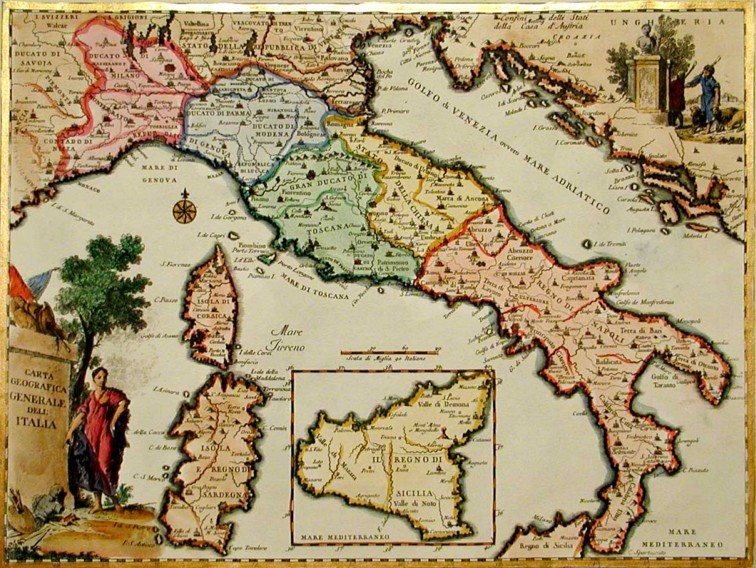Citizenship Claims by Italian Descendants Born Abroad
The legal requirements for recognition of Italian citizenship claims made by persons born abroad, but whose births were never registered with an Italian consular agency, vary considerably according to particular circumstances, and also depend upon existing treaties between the Italian Republic and various states. Therefore, if claimants born in Great Britain, the United States and Argentina each queried an Italian consular officer in their respective countries with regard to this procedure, each would receive different answers to some of the same questions. It is our intention to present a general description of the procedures involved, and particularly the genealogical requirements, especially for claimants born and resident outside Italy. For our purposes, we shall consider births under normal conditions, as opposed to circumstances such as adoption.
Italian citizenship is based primarily on lineage, as opposed to geography (i.e. birth in Italy) or naturalization. However, an Italian bloodline is not, in itself, sufficient grounds for claiming Italian citizenship. One is an Italian citizen if he-she is born to a parent who is an Italian citizen. Citizenship may be transmitted through the childïs mother, father, or through both parents. However, a claim to Italian citizenship is made only through one parent per generation. Legitimacy of birth is not required if the citizenship is claimed through the mother; it is normally required if claimed through the father of a child born outside Italy. It is also necessary to establish definite identification of the person(s) through whom citizens ship is claimed. If, for example, Christina Clark seeks to claim citizenship through her fater, born in Italy as Giuseppe Calarco, but her own birth registration indicates his name as Joseph Clark, it would be nececary for her to establish to the satisfaction of consular authorities that Giuseppe Calarco and Joseph Clark are in fact the same person; this may require that particular records (for example, a legal document authorizing a change of name) be produced in addition to normal circumstances, Italian residency of his-her descendants is not required for them to claim Italian citizenship. It should be noted that when a family has resided outside Italy for several generations, the last ancestor recognized as an Italian citizen may have been born more than a century ago. If born before 1860, he would have been a citizen of one of the nations (Kingdom of Sardinia, Kingdom of the Two Sicilies, etc.) to which the Kingdom of Italy and subsequently (since 1946) the Italian Republic are successor states.
The most important acts and documents relate to births, marriages and citizenship for each ancestral generation. A renunciation of Italian citizenship may influence the claim, An example best explains this (see genealogy illustrated on reverse). Giuseppe Rosso is born Italy in 1895, and emigrates in 1925. In 1927, he weds in the United States Karen Volker, a German citizen, who gives birth to a son, John, in 1929. Giuseppe becomes an American citizen in 1932, having renounced his Italian citizenship the year before. Karen also becomes a United States citizen. John, however, was already an American citizen because he was born in the United States (where geography is the principal determinant of citizenship). John is likewise an Italian citizen because he was born to an Italian citizen. As an infant, he could not renounce his Italian nationality, and his father could not do so for him. John remains an Italian citizen unless he ever decides to renounce this right legally. Another child, Carl, is born to the couple in 1934. Carl is not an Italian citizen because he was born to a father who is no longer an Italian citizen. John, being an Italian citizen, transmits this right to his children. Carl, however, is not an Italian citizen and has no citizenship right to transmit. In the event, John and his children cannot exercise their rights as Italian citizens unless they are recognized as citizens by the Italian Republic. If Johnïs birth or citizenship was never registered with an Italian consulate, his children must demonstrate their status (and their fatherïs) as Italian citizens if they wish to obtain the exercise of these rights.
The basis for obtaining these rights outside Italy is usually a petition for a certificate of citizenship (certificato di cittadinanza), normally a prerequisite for an Italian passport.
Which documents will you need? You will be required to produce, at the least, a certificate of birth and a certificate of marriage for each foreign-born ancestor through whom your claim is made, as well as the Italian- born ancestor. These documents must indicate parentage. They might relate to a father, grandfather and great grandfather. In most countries, you must provide proof of the date of naturalization for any ancestor who renounced his-her Italian nationality. (In the United States, for example, an act of naturalization can be obtained through the local court before which the ancestor swore allegiance to the government, and a document indicating that a foreign-born ancestor never became an American citizen is obtained through the Immigration and Naturalization Service.) All documents must be properly sealed. You may be required to provide an apostille certification (a form of naturalization recognized internationally) for documents released by a nation outside the European Community. Non-Italian documents usually must be translated officially for a fee by an Italian consular officer or authorized agent. Within the European Community, however, it is usually possible to obtain multi-lingual vital statistics certificates which obviate the need for this service. A simple family tree clearly indicating the line of descent and acts for which supporting document are provided should accompany these items.
How much will the procedure cost? This depends upon various factors, such as the number of generations involved. At the minimum, a petition involving several generations and various supporting documents, with the required translations, certificates and fees, will cost several hundred dollars or pounds.
It is not the purpose of this guide to offer legal advice; particular queries should be addressed to the Italian consulate having jurisdiction in your locality, or to an Italian attorney qualified to represent a client in thesr matters. Under normal conditions, legal consultation will not be necessary, although the services of a professional genealogist may be required for document searches in Italy.
Although most governments do not prohibit dual nationality to their own citizens, certain legal conditions should be considered, and foreign-born claimants for Italian citizenship are strongly advised to consult the competent government agency regarding any questions pertaining to this matter.



